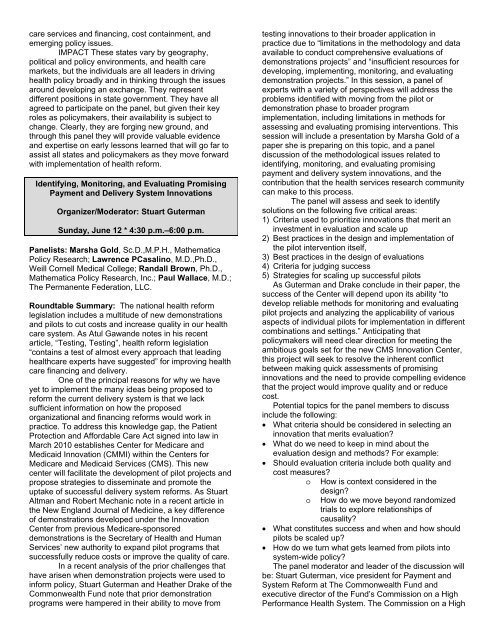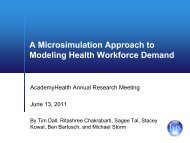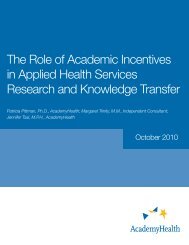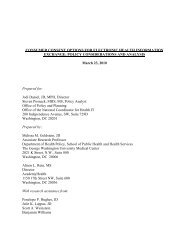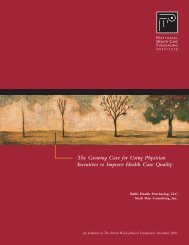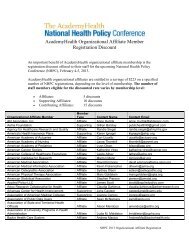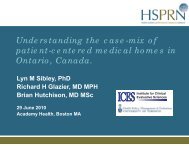Policy Roundtable Abstracts - AcademyHealth
Policy Roundtable Abstracts - AcademyHealth
Policy Roundtable Abstracts - AcademyHealth
Create successful ePaper yourself
Turn your PDF publications into a flip-book with our unique Google optimized e-Paper software.
care services and financing, cost containment, and<br />
emerging policy issues.<br />
IMPACT These states vary by geography,<br />
political and policy environments, and health care<br />
markets, but the individuals are all leaders in driving<br />
health policy broadly and in thinking through the issues<br />
around developing an exchange. They represent<br />
different positions in state government. They have all<br />
agreed to participate on the panel, but given their key<br />
roles as policymakers, their availability is subject to<br />
change. Clearly, they are forging new ground, and<br />
through this panel they will provide valuable evidence<br />
and expertise on early lessons learned that will go far to<br />
assist all states and policymakers as they move forward<br />
with implementation of health reform.<br />
Identifying, Monitoring, and Evaluating Promising<br />
Payment and Delivery System Innovations<br />
Organizer/Moderator: Stuart Guterman<br />
Sunday, June 12 * 4:30 p.m.–6:00 p.m.<br />
Panelists: Marsha Gold, Sc.D.,M.P.H., Mathematica<br />
<strong>Policy</strong> Research; Lawrence PCasalino, M.D.,Ph.D.,<br />
Weill Cornell Medical College; Randall Brown, Ph.D.,<br />
Mathematica <strong>Policy</strong> Research, Inc.; Paul Wallace, M.D.;<br />
The Permanente Federation, LLC.<br />
<strong>Roundtable</strong> Summary: The national health reform<br />
legislation includes a multitude of new demonstrations<br />
and pilots to cut costs and increase quality in our health<br />
care system. As Atul Gawande notes in his recent<br />
article, “Testing, Testing”, health reform legislation<br />
“contains a test of almost every approach that leading<br />
healthcare experts have suggested” for improving health<br />
care financing and delivery.<br />
One of the principal reasons for why we have<br />
yet to implement the many ideas being proposed to<br />
reform the current delivery system is that we lack<br />
sufficient information on how the proposed<br />
organizational and financing reforms would work in<br />
practice. To address this knowledge gap, the Patient<br />
Protection and Affordable Care Act signed into law in<br />
March 2010 establishes Center for Medicare and<br />
Medicaid Innovation (CMMI) within the Centers for<br />
Medicare and Medicaid Services (CMS). This new<br />
center will facilitate the development of pilot projects and<br />
propose strategies to disseminate and promote the<br />
uptake of successful delivery system reforms. As Stuart<br />
Altman and Robert Mechanic note in a recent article in<br />
the New England Journal of Medicine, a key difference<br />
of demonstrations developed under the Innovation<br />
Center from previous Medicare-sponsored<br />
demonstrations is the Secretary of Health and Human<br />
Services’ new authority to expand pilot programs that<br />
successfully reduce costs or improve the quality of care.<br />
In a recent analysis of the prior challenges that<br />
have arisen when demonstration projects were used to<br />
inform policy, Stuart Guterman and Heather Drake of the<br />
Commonwealth Fund note that prior demonstration<br />
programs were hampered in their ability to move from<br />
testing innovations to their broader application in<br />
practice due to “limitations in the methodology and data<br />
available to conduct comprehensive evaluations of<br />
demonstrations projects” and “insufficient resources for<br />
developing, implementing, monitoring, and evaluating<br />
demonstration projects.” In this session, a panel of<br />
experts with a variety of perspectives will address the<br />
problems identified with moving from the pilot or<br />
demonstration phase to broader program<br />
implementation, including limitations in methods for<br />
assessing and evaluating promising interventions. This<br />
session will include a presentation by Marsha Gold of a<br />
paper she is preparing on this topic, and a panel<br />
discussion of the methodological issues related to<br />
identifying, monitoring, and evaluating promising<br />
payment and delivery system innovations, and the<br />
contribution that the health services research community<br />
can make to this process.<br />
The panel will assess and seek to identify<br />
solutions on the following five critical areas:<br />
1) Criteria used to prioritize innovations that merit an<br />
investment in evaluation and scale up<br />
2) Best practices in the design and implementation of<br />
the pilot intervention itself,<br />
3) Best practices in the design of evaluations<br />
4) Criteria for judging success<br />
5) Strategies for scaling up successful pilots<br />
As Guterman and Drake conclude in their paper, the<br />
success of the Center will depend upon its ability “to<br />
develop reliable methods for monitoring and evaluating<br />
pilot projects and analyzing the applicability of various<br />
aspects of individual pilots for implementation in different<br />
combinations and settings.” Anticipating that<br />
policymakers will need clear direction for meeting the<br />
ambitious goals set for the new CMS Innovation Center,<br />
this project will seek to resolve the inherent conflict<br />
between making quick assessments of promising<br />
innovations and the need to provide compelling evidence<br />
that the project would improve quality and or reduce<br />
cost.<br />
Potential topics for the panel members to discuss<br />
include the following:<br />
What criteria should be considered in selecting an<br />
innovation that merits evaluation<br />
What do we need to keep in mind about the<br />
evaluation design and methods For example:<br />
Should evaluation criteria include both quality and<br />
cost measures<br />
o How is context considered in the<br />
o<br />
design<br />
How do we move beyond randomized<br />
trials to explore relationships of<br />
causality<br />
What constitutes success and when and how should<br />
pilots be scaled up<br />
How do we turn what gets learned from pilots into<br />
system-wide policy<br />
The panel moderator and leader of the discussion will<br />
be: Stuart Guterman, vice president for Payment and<br />
System Reform at The Commonwealth Fund and<br />
executive director of the Fund’s Commission on a High<br />
Performance Health System. The Commission on a High


